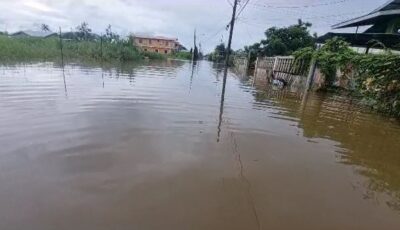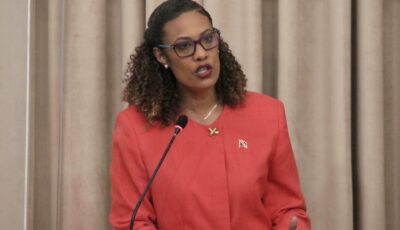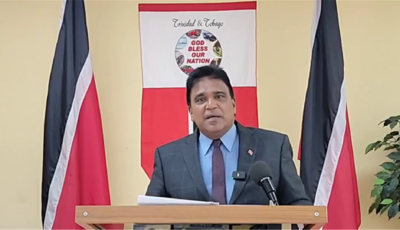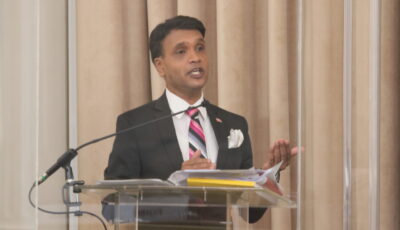HEADLINES
Commentary
Rowley strenuously objected to the construction of Penal-Debe UWI Campus
The media is reporting that the UWI Penal-Debe Campus, built during the People’s Partnership Administration continues to sit empty and has never
Posted On 30 Oct 2023
Blighted WGTL Project continues to haunt PNM
That World Gas-to-Liquids project is another of the many PNM scandals and failed projects which has cost taxpayers billions of dollars! And it is
Posted On 22 Jun 2023
Who financing Balisier House?
Ferdinand Ferreira, a founding member of the People’s National Movement (PNM), is quoted in the media as saying that the party has always
Posted On 03 Apr 2023
UNC SENATORS DEFENDED THE PARTY WELL TODAY
Today, the Opposition UNC Senators defended themselves and the Party well from the frivolous, anti-democratic motion by Senator Anthony Viera.
Posted On 22 Feb 2022
COVID WORKERS FIGHTING A WAR WITHOUT THEIR PROPER WEAPONS
We congratulate Kamla Persad-Bissessar on her success in forcing the Government to conduct an inquiry into the handling of covid. We take this
Posted On 20 Feb 2022
Letters
For fools rush in where angels fear to tread
The National Security Minister’s recent unrestrained language and conduct towards judges and unjustified criticisms of their judicial functions
Posted On 14 May 2023
Seek a fresh mandate
I recently read in one of the daily newspapers that Minister of National Security Fitzgerald Hinds said that 70% of society wants to see him
Posted On 27 Dec 2022
Don’t Blame God for Rowley’s Dotishness
Prime Minister Keith Rowley at the PNM convention on December 4, 2022, announces a National Day of Prayer. He said the country must come together
Posted On 16 Dec 2022
Keith Rowley has betrayed the sanctity of Parliament
Dear Editor, The revelation by the Commissioner of Police that the emails which Keith Rowley, then Opposition Leader read in our nations
Posted On 19 Jul 2019
T&T owes Kamla a debt of gratitude
Kamla Persad-Bissessar did what many were not expecting… she and her MPs voted unanimously with the Government to ensure passage of the Civil
Posted On 09 Apr 2019
Press Releases
Tancoo: Flooding imminent as Government fails to act
After a couple days of scattered “April showers” earlier this week, MP for Oropouche West, Dave Tancoo is again warning that severe flooding in
Posted On 06 Apr 2024
MP Khadijah Ameen wants justice for Kiss Driver’s death
Member of Parliament for St. Augustine, Ms. Khadijah Ameen is calling for justice for the death of Kiss delivery driver, Neil Ballai. Ballai was
Posted On 06 Apr 2024
UNC’s Persistent Pressure Forces Rowley Gov’t to Release 2024 EBC Report
On the heels of intense, consistent pressure from the UNC over their highly questionable refusal to lay the 2024 EBC Boundaries Report in
Posted On 06 Apr 2024
Moonilal: Hinds Fails Fire Service, Lives at Risk as Equipment Crumbles
The collapse of the Trinidad and Tobago Fire Services is another crushing indictment on the spectacularly failed Fitzgerald Hinds as Minister of
Posted On 05 Apr 2024
Padarath: Gov’t Electricity Rate Hike “Unbearable Burden”
Princes Town MP, Barry Padarath said that the contents of a report in yesterday’s Business Guardian headlined “RIC Recommends
Posted On 05 Apr 2024
Speeches
Tancoo: calls on Imbert to have a heart and indemnify the population
Today we come to you to shine some light on a very worrying development that has happened in the past few days. I am sure many of you saw or
Posted On 08 Sep 2021
Rowley’s Mad Power Grab in Tobago
My friends, we are seeing a government that is in freefall – in every single sector. Health, National Security, the business sector. And what
Posted On 16 Feb 2021
Presentation of UNC general election candidates 2020
T&T family! UNC family! It is my absolute pleasure to speak with you today, as we get ready for the sweeping victory that is to come on
Posted On 19 Jul 2020
Kamla: My vision is to build an intelligent nation
“ON THE BALLOT” UNC VIRTUAL MEETING (June 25, 2020) Introduction Good evening and thank you for joining us once again as we continue to set the
Posted On 26 Jun 2020
MNF – Kamla: There is hope
Introduction Good evening T&T! Good evening UNC family! It is good to be back! 2020 we are ready to rumble! Are you ready? Even though it’s
Posted On 11 Mar 2020
Copyright © - 2023 United National Congress







Regrettable opposition comments
Last week, following the signing of what must be a complex memorandum, Imbert claimed that foreign news reports on the partial agreement suggested that it “favoured Venezuela”. Without adducing an ounce of proof, he and Dr Rowley translated that to mean that all ten trillion or so cubic feet of gas contained in the fields will go to Venezuela via a yet-to-be-constructed 270-kilometre pipeline.
If we are to believe the opposition trio, Energy Minister Kevin Ramnarine has “sold out” Trinidad and Tobago’s 2.6 tcf share of the gas for God-knows-what. Their claim, which Ramnarine denied, was spurious, even mischievous, since none of the reports they alluded to quoted Venezuela’s Petroleum Minister, Rafael Ramirez, as saying that his country will harvest all the gas.
The Reuters report on the issue stated, “Venezuela and Trinidad and Tobago said that Venezuela’s state oil company PDVSA will work with US company Chevron to develop an offshore natural gas field, one of three that span the Caribbean countries’ maritime border. The deal follows six years of bi-national talks about how to share the reserves fairly….”
What makes the opposition allegations more distressing is that since they were in office when the operators struck gas, they will have known the facts. There are three fields that make up Loran/Manatee that straddle the Venezuela-T&T border. Based on our maritime boundaries, from early o’clock the fields were said to hold around ten tcf of “gas in place”, with roughly 73 per cent belonging to Venezuela and 27 per cent to T&T.
On our side of the border, energy majors Chevron and British Gas did the drilling. On Venezuela’s side, Chevron and state-owned PDVSA were involved. The discovery was made back in 2005 or thereabouts, and talks between Port of Spain and Caracas on how both countries could best monetise the bounty began shortly thereafter. They dragged on for years, and Minister Ramnarine must be complimented for having expedited the process to arrive at an agreement that is mutually satisfactory.
We have not seen the document, which we understand is still incomplete, but from what we have gleaned, a joint-venture involving Chevron and PDVSA will explore the first field. Presumably, the recovered gas will be shared between the two countries on a proportional basis.
Does it matter on which side of the border production will start? Hardly. In fact, since the fields are close to each other, it makes good business sense to drill from one point, sharing the costs. In any event, Chevron, which is a partner to both countries, is a reputable major that has operated in T&T for many years.
If the opposition contention is that Venezuela’s share of the gas should have come to Atlantic for processing, really, do they expect us to dictate to Caracas? That might have been mutually beneficial, but how they monetise their gas is completely up to them.
In the circumstances, they have opted to pipe their gas to their fledgling Marsical-Sucre project, a LNG plant they have toyed with since 2003. Venezuela has more than 200 tcf in proved gas reserves, but no downstream gas development. Now, they seem poised to make that leap, and the Loran/Manatee fields form part of the new thrust.
Given our vast experience and expertise in downstream industries, on which Minister Ramirez has commented favourably, we should seek to grasp opportunities that may arise in Venezuela. We have a vast pool of technical personnel who can help usher in a new era in our neighbour’s diversification of its huge energy sector.
At a time like this, and on an issue like this, we need to set aside political differences and seek the best interest of the country. The PNM, under whose stewardship the downstream gas sector expanded to what it is today, knows this. It is why we find their comments regrettable.
EXPRESS
Share this:
Like this:
About the Author
AG has proven himself
Rambachan: calls for general election unwarranted
Upcoming Events
YouTube Channel
Follow Us
FACEBOOK
FACEBOOK
FACEBOOK
FACEBOOK
FACEBOOK
FACEBOOK
FACEBOOK
FACEBOOK
FACEBOOK
FACEBOOK
FACEBOOK